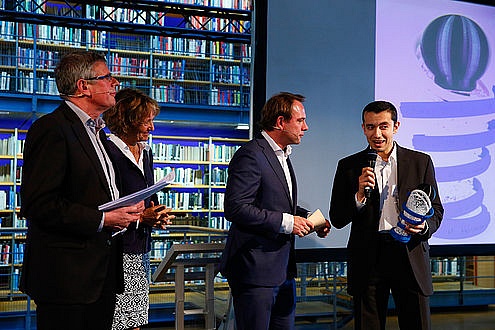Assistant Professor Zaid Al-Ars has received the inaugural DIG-it! Award that included a €10,000 grant.
Al-Ars was presented with the €10,000 grant as part of the DIG-it! event held in the TU Delft Library on Tuesday November 11, 2014 for his research into faster DNA analysis for cancer diagnostics.
The Award was given to the most innovative research project from TU Delft.
DIG-it! is an event organised by TU Delft and is aimed at providing an overview of innovative research projects from across the university. It gives the projects exposure and offering visitors a look at the breadth of topics covered within the different faculties of TU Delft. There were 80 projects presented from an initial list of 700 submissions.
Requested by his faculty to submit a proposal around July this year, Al-Ars was a last minute submission to the DIG-it! event and the assistant professor was unaware that there was a prize awarded as part of the event, let alone that there was a grant attached to it. He is, therefore, unsure about what the grant will go towards funding. “I thought the event was simply an opportunity to showcase technology,” said Al-Ars, “winning the funds is an unexpected bonus as my research is currently unfunded.”
Al-Ars says the development of his research has been a collaboration of a multidisciplinary group over many years. He started by collaborating with a biology professor from the University of Leiden then began working with TU Delft master’s student Marijn Kentie on developing a Smith Waterman algorithm to increase the accuracy of DNA analysis, then moved to working on a trial implementation with the University Medical Centre Utrecht in collaboration with Professor Edwin Cuppen.
It was during this last phase that Al-Ars changed the focus of his research from accelerating more accurate algorithms to accelerating approximate algorithms already used in practice. “I was told by the geneticists at the University Medical Centre Utrecht that they didn’t want to work with my accurate algorithm; they wanted to stay using the diagnostics algorithms they knew and trusted. I then realised that I had to work within the existing diagnostics technology and instead create faster processing units to speed up the diagnosis process in order to more quickly diagnose cancer” said Al-Ars.
Al-Ars says that his research is not of notoriety. “While I would one day love to publish research in a prestigious peer-review journal, the research I am now doing is not ground-breaking; I have not discovered anything new. I am simply working with the systems that exist to streamline the process.” He paused then added “ But when you can have a positive change on the lives of paediatric cancer patients, why wouldn’t you be motivated.”



Comments are closed.